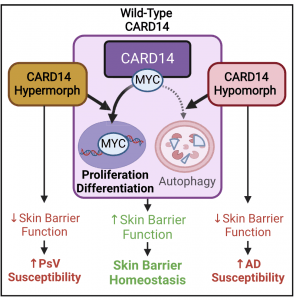Our skin, the body’s largest organ, acts as a formidable shield against infections and other health threats. Decades of research have revealed that skin barrier dysfunction can lead to a variety of diseases. Researchers have uncovered a novel molecular signalling pathway that plays a critical role in maintaining skin barrier integrity (Figure 1).
This study could pave the way for innovative treatments for inflammatory skin diseases like atopic dermatitis (eczema) and psoriasis. The research team identified the protein CARD14 as a key player in skin barrier health. When CARD14 functions correctly, it helps maintain a healthy skin barrier. However, when CARD14 malfunctions, it can contribute to skin diseases.
The researchers found that CARD14 directly interacts with MYC, a protein involved in regulating cell growth. This interaction is crucial for a healthy skin barrier and protects against skin diseases. Additionally, given MYC’s association with cancer, the study suggests that dysfunctional CARD14-MYC signalling may contribute to certain types of cancer.
Previous research had focused on the CARD14-NFκB signalling pathway, which is linked to skin diseases. However, this new study highlights the importance of the CARD14-MYC pathway in skin barrier health. The researchers discovered that CARD14 regulates skin barrier function through two mechanisms: stimulating NFκB to establish an antimicrobial barrier and stimulating MYC to help build a physical barrier.
Journal article: DeVore, S. B., et al. 2024. Regulation of MYC by CARD14 in human epithelium is a determinant of epidermal homeostasis and disease. Cell Reports.
Summary by Stefan Botha











